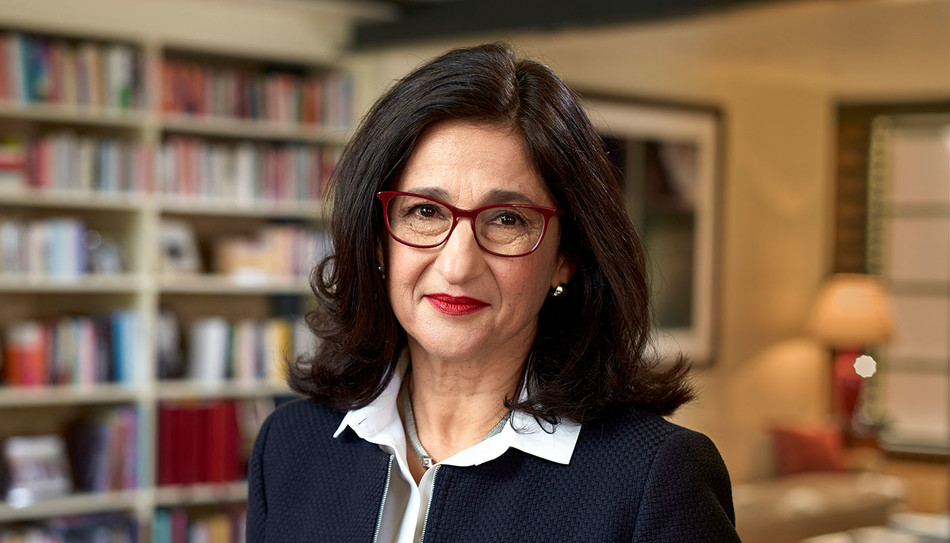Last spring, after Lee C. Bollinger announced that he would conclude his presidency at the end of the 2022–23 academic year, the twenty-four-member Board of Trustees formed a fifteen-member committee to find his successor. The committee, which included faculty, trustees, and alumni, began its work in June of 2022, scouring the globe for six months in search of the ideal person to build on Bollinger’s twenty-one-year legacy and lead Columbia into the future.
The results of that formidable endeavor were revealed earlier this year in a ceremony in the World Room in Pulitzer Hall, where the chair of the Trustees, Jonathan Lavine ’88CC, described what had gone into the selection of Nemat “Minouche” Shafik as the twentieth president of Columbia University.
According to Lavine, the search committee, led by Trustees co-chair emerita Lisa Carnoy ’89CC, spent four hundred hours researching, interviewing, and deliberating, aided by four advisory groups representing faculty, staff, students, and alumni and totaling more than eighty people. The committee performed four University-wide surveys that generated more than five thousand responses about the qualities Columbians were looking for in their next president. It fielded some six hundred nominations and held in-depth interviews with the strongest candidates.
At the ceremony, Lavine recalled the moment last year when Claire Shipman ’86CC, ’94SIPA, a vice chair of the Board of Trustees, asked Lavine, whom she knew was traveling to London, if he could meet with a promising candidate who had popped up on an early list: Minouche Shafik, president of the London School of Economics and Political Science, an economist with degrees from the University of Massachusetts, the University of London, and the University of Oxford. Shafik had also been deputy governor at the Bank of England, where she led a review of misconduct in financial markets; a deputy managing director at the International Monetary Fund; and the youngest-ever vice president at the World Bank, where she worked on environmental issues.
A lunch in London was hastily arranged.
Lavine said that when he met with Shafik he was struck by her aura of leadership and was “blown away by how wildly prepared she was for a meeting she had found out about just three days earlier.” She posed some of the most incisive questions about Columbia that Lavine had ever been asked and “appeared to know more in three days’ prep than I had accumulated in my thirty-five-year association with the University.” As Shafik and Lavine talked about science, politics, and economics, Lavine was impressed, he said, by her brilliance, empathy, curiosity, endless optimism, and profound sense of fairness. Further interviews, he added, revealed “a spectacular listener” who possessed “a fundamental understanding that universities exist to create, advance, and apply knowledge in the real world to solve pressing problems.”
In Pulitzer Hall, Lavine introduced the new president. The audience — which included, in the front row, Shafik’s husband, the climate scientist Raffael Jovine; President Bollinger and his wife, Jean Magnano Bollinger ’72TC; and J-school dean Jelani Cobb — rose in applause.
Shafik, sixty, opened her remarks by recognizing Bollinger, calling him “a legend in higher education” who as president did “what only the rarest and most capable stewards of institutions do: he showed great respect for the traditions passed down over 268 years while simultaneously modernizing the institution and preparing it for what comes next.”
Then Shafik told the Columbia community about herself. She recounted how, when she was four, her family fled Egypt (their property had been seized in Nasser’s nationalization program) and spent the next decade moving around the American South, where she attended schools in Florida, Georgia, and North Carolina (when kids asked if she was Black or white, she said she was “brown”). “I was a child of the desegregation era, and when you’re always the new kid, in a new town, at a new school, books become your constant friends,” Shafik explained. “I read Jane Goodall and wanted to become an anthropologist; now here I am just steps away from the oldest anthropology department in the US. I was fascinated by the Watergate scandal and read All the President’s Men, wanting to be a journalist and fight for truth and justice; and today I address you in the World Room of Pulitzer Hall, home to one of the world’s greatest journalism schools.”
Shafik, whose father and grandfather were chemistry PhDs, emphasized how books and learning can surmount the most dislocating alienation. “For a family that was forced to start over, education was our salvation,” she said. So it is “for the many students at Columbia who come from parts of the world which are plagued by conflict or grinding poverty, who return home from Columbia with educations that enable them to plant seeds for democracy and opportunity.” She spoke from experience about the role of education in the lives of students “who are disadvantaged here in the US because of their race, faith, class, gender, or sexual orientation, who go on to overcome discrimination and thrive.”
With their enthusiastic applause, the World Room guests signaled their accord with Lavine’s declaration that the search committee’s diligence had paid off. “We found the individual who will set Columbia on the course of a new transformative era,” Lavine said, validating an intensive search that he called “exhaustive and I daresay exhausting.”
And as if bringing Minouche Shafik to Columbia weren’t enough, Lavine shared another nugget of good news: after their arduous six-month, four-hundred-hour expedition, the search-committee members were still speaking to each other.



